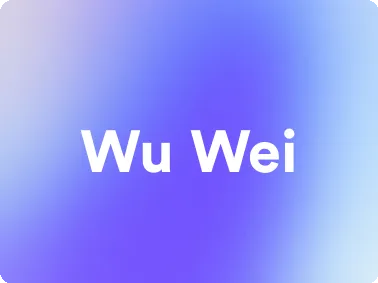Wu Wei: The Art of Effortless Action
This guide will walk you through the essential elements of using wu wei - the productivity method to keep your team productive and engaged.
Try Lark for Free
Preface: In the modern world, the pursuit of productivity often leads to a constant struggle and hustle. However, there is an ancient Chinese concept that suggests a different approach — wu wei. In this comprehensive guide, we will delve into the essence of wu wei, its origin, practical applications, and step-by-step implementation to achieve a state of effortless action and enhanced productivity.
Understanding Wu Wei in the Context of Productivity
Wu wei, translated as "non-doing" or "effortless action," is a fundamental concept in Taoism. It refers to a state where one effortlessly aligns with the natural flow of the universe, achieving harmony and effectiveness without forceful action. In the context of productivity, wu wei emphasizes working smart over working hard, allowing tasks to unfold naturally and effortlessly.
The Origin of Wu Wei
Wu wei originates from ancient Chinese philosophy and is a core principle of Taoism. It dates back to the foundational text of Taoism, the Tao Te Ching, attributed to the sage Lao Tzu. The concept emphasizes the balanced and harmonious way of life, imparting wisdom on how to navigate challenges with ease and grace.
Use Lark to unleash your team productivity.
Who Can Benefit from Wu Wei?
Wu wei is for individuals seeking a more balanced and fulfilling approach to productivity and life. It is especially beneficial for:
- Entrepreneurs and Business Leaders: Those aiming to streamline their operations and decision-making processes.
- Creatives: Artists, writers, and innovators looking to unlock their creative potential effortlessly.
- Professionals: Individuals seeking to enhance their work performance while reducing stress and burnout.
Exploring the Pros and Cons of Wu Wei
Pros
Embracing wu wei can bring forth numerous advantages:
- Enhanced Efficiency: By working in alignment with natural rhythms, tasks are accomplished more effortlessly.
- Reduced Stress: The approach promotes a sense of calm and inner peace, leading to reduced stress and anxiety.
- Greater Creativity: It allows for the spontaneous flow of ideas and inspiration, fostering creativity.
Cons
While wu wei offers remarkable benefits, there are potential drawbacks to consider:
- Misinterpretation: It may be misconstrued as passivity, leading to inaction rather than purposeful non-doing.
- Cultural Variations: The concept may be challenging to apply directly in cultures that prioritize rapid and aggressive action.
Learn more about Lark x Productivity
Getting Started with Wu Wei
To embrace wu wei and integrate it into your daily life, consider the following steps:
- Cultivate Awareness: Begin by tuning into your natural inclinations and the pace of the environment around you.
- Choose Situations Wisely: Identify areas where applying wu wei can bring about positive change, and start with small, manageable tasks.
- Let Go of Control: Release the urge to micromanage and allow events to unfold naturally, intervening only when necessary.
Use Lark to unleash your team productivity.
Actionable Tips for Embracing Wu Wei
- Practice Stillness: Allow moments of silence and stillness to generate clarity and facilitate the natural flow of events.
- Trust Intuition: Listen to your intuition and innate wisdom, allowing it to guide your actions effortlessly.
- Find Balance: Seek equilibrium in all aspects of life, avoiding extremes, and fostering a state of wu wei.
Do's and Dont's
| Do's | Dont's |
|---|---|
| Practice patience and trust in the process. | Force outcomes through excessive control. |
| Embrace flexibility and adaptability. | Succumb to impulsiveness and reactionary behavior. |
| Prioritize essential tasks for focused action. | Overburden yourself with unnecessary responsibilities. |
Conclusion
In conclusion, the concept of wu wei offers a profound shift in perspective towards productivity and action. By aligning with the natural flow of events and embracing effortless action, individuals can achieve a harmonious balance between productivity and well-being.
Use Lark to unleash your team productivity.
